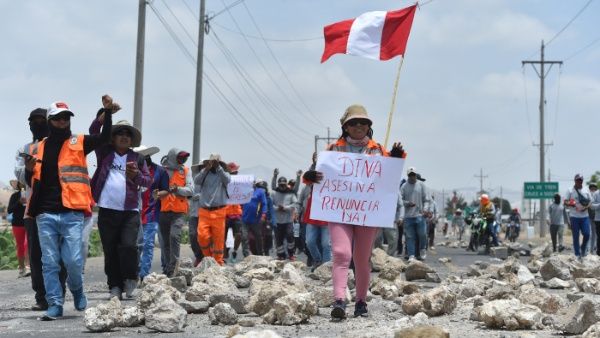The inquiry comes after at least 17 people were killed in the country’s southern Puno region on Monday – the most deadly day of protests since former President Pedro Castillo was ousted and detained last month. The violence continued on Tuesday with a police officer dying in his car after he was trapped inside when it was set alight.
Prime Minister Alberto Otarola on Tuesday imposed a nighttime curfew in Puno, which will last three days and run from 8.00pm to 4.00am local time (01:00-09:00 GMT).
Protesters in Puno are among Castillo’s staunchest supporters and are angry at his replacement by Boluarte, who was appointed by Congress in early December following Castillo’s removal and arrest. The demonstrators have been calling for Boluarte’s resignation as well as early elections and the release of Castillo, who is serving 18 months in pre-trial detention on charges of “conspiracy” and “rebellion”, which he denies.
The attorney general’s office said it was investigating Boluarte, Otarola, Defence Minister Jorge Chavez and Interior Minister Victor Rojas on charges of “genocide, qualified homicide and serious injuries.”
Human rights groups have accused authorities of using firearms on protesters and dropping smoke bombs from helicopters. The army says protesters have used weapons and homemade explosives.
The attorney general’s office also said it would investigate former Prime Minister Pedro Angulo and former Interior Minister Cesar Cervantes, both of whom served under Boluarte for just a few weeks, for their involvement in handling the protests.
The president’s and ministers’ offices did not immediately respond to requests for comment. “In Peru there have been seven presidents in just over five years so the reality is that this is a very unstable country and presidents have come and gone in a matter of weeks,” Ben Norton, an expert in Peru at the Geopolitical Economy Report told Al Jazeera.
Legislators voted to remove Castillo from office on December 7, shortly after he announced plans to “temporarily” dissolve Congress and rule by decree in what he said was an effort to “re-establish the rule of law and democracy,” His critics, including Boluarte, who was serving as Castillo’s vice president at that time, rejected the move as an attempted coup.
A left-wing, former rural teacher, Castillo faced multiple corruption allegations and political showdowns with Peru’s opposition-dominated Congress during his short tenure as president. Many of the protests since his removal have taken place in his rural strongholds, where residents say they have been neglected for years.
On Tuesday, Amnesty International urged Peruvian authorities to end what it called “unnecessary and disproportionate use of force” against civilians after the deaths in the country’s south. “The escalation of violence taking place in Peru is unacceptable. State repression against demonstrators and the loss of human lives is exacerbating the crisis,” Marina Navarro, executive director of Amnesty International Peru, said in a statement.
“We reiterate our call to the authorities for complete respect for human rights. Security forces must comply with international standards on the use of force. The people should not have to pay the price of the political crisis the country is going through.”
While the exact circumstances that led to the deaths remain unclear, Peru’s authorities have said most of the bloodshed took place when protesters tried to storm the airport in the city of Juliaca, which was being guarded by security forces.
Fourteen people were killed there, many having suffered gunshot wounds, according to an official at a Juliaca hospital, as reported by the AFP news agency.
Meanwhile, a United Nations Human Rights Office spokesperson, Marta Hurtado, called on Peru’s authorities “to carry out prompt, impartial and effective investigations into the deaths and injuries, holding those responsible to account and ensuring victims receive access to justice and redress”.
Boluarte’s administration declared a nationwide state of emergency last month, suspending freedom of movement and assembly in a bid to quash the unrest. The Peruvian government has said that it respects the right to protest, but that it has an obligation to protect the public from violent demonstrators.
Last week, Boluarte blamed the protests for “delays, pain, economic losses” and urged “peace, calm, unity to promote development of the homeland.” Her government won a vote of confidence in Congress, a constitutional requirement after a new prime minister takes office, by a wide margin on Tuesday evening. A loss would have triggered a cabinet reshuffle and the resignation of Otarola.
 Escambray ENGLISH EDITION
Escambray ENGLISH EDITION





Escambray reserves the right to publish comments.